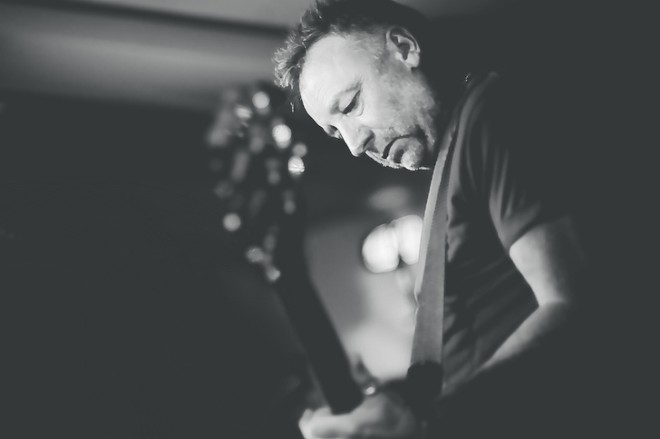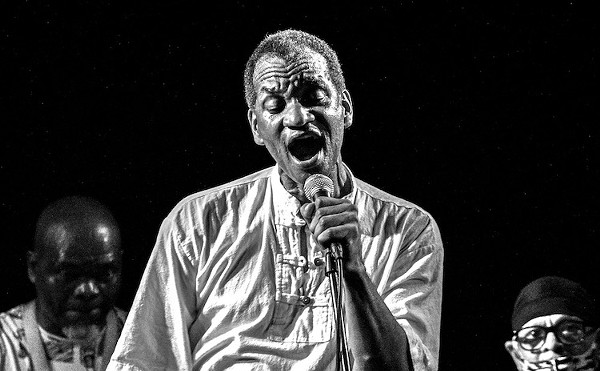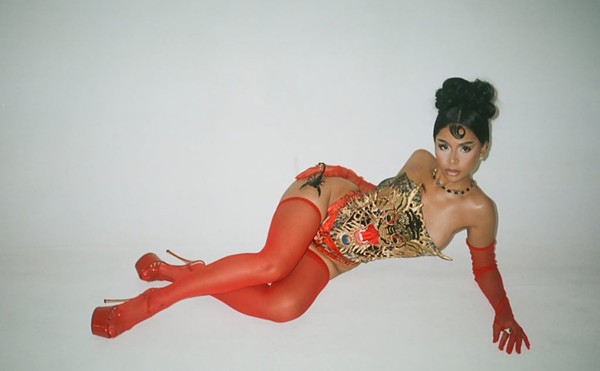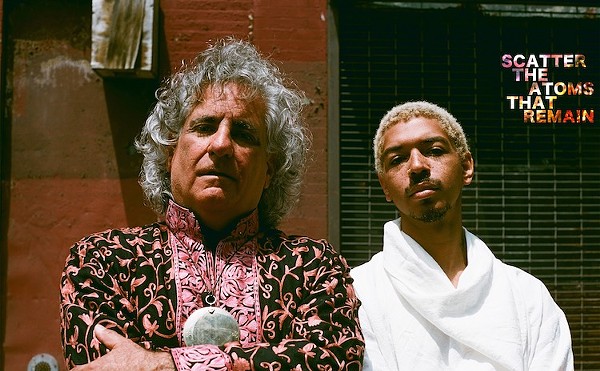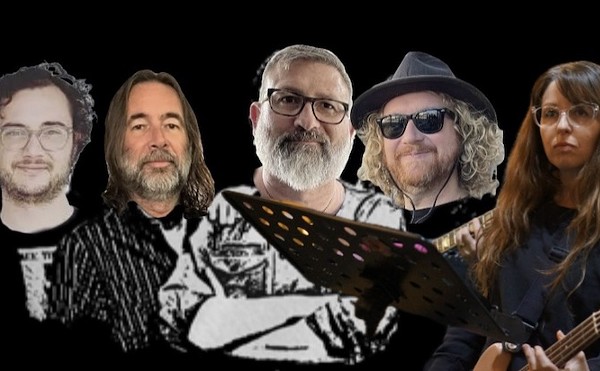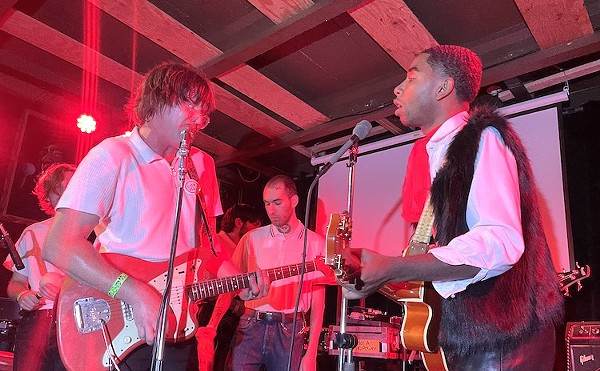Full Transmission: Joy Division's Peter Hook in his own words
By Matthew Weller on Thu, Nov 17, 2016 at 1:10 pm
Looking over our recent feature on New Order and Joy Division's Peter Hook in this week's issue, we realized that so many insights from the bassist and human quote machine had been left on the cutting room floor.
To remedy that injustice, here's the full transcript from our conversation.
Orlando Weekly: So with this new tour — how is it going first off?
Peter Hook: Uh, well we’ve nearly sold out three-quarters of them so I’m very, very happy about that. Very surprising, this is only our third tour of America playing this stuff. But it seems to be being very well received.
That’s very good to hear. You’re playing Substance, both the Joy Division and the New Order album. Why did you choose that one? Why those collections of singles?
In 2010, I made the decision to celebrate Ian Curtis’s life by going through all the albums. Starting with the first one, which was Unknown Pleasures, then playing Closer, and then Still, and then moving into New Order. And basically, Substance New Order is number eight and Substance Joy Division is number nine. So were moving through the albums quite well.
When you’re playing the songs, whether it’s from New Order or Joy Division, do you try to play it spot-on with the record or are they your own interpretations?
Yes, our gimmick — if you like — is to celebrate the original recordings. As a group, even when I was in New Order, [we] had sort of dabbled with changing the orders and we basically started playing remixes and stuff. And some fans liked it and some fans didn’t. But I felt we had sort of veered away from our original concept, shall we say. So it’s been nice to actually get my own way.
When you’re playing with different musicians, does anything feel better? Is any part of it better than it was originally?
It feels original. I suppose, whether it is better or not, beauty is in the eye of the beholder.
For you personally, do you enjoy anything more?
You know what? The obvious thing is, when I started playing the New Order albums, I was amazed to find the music was ignored nearly as much as bloody Joy Division’s music. So a lot of these older songs from New Order hadn’t been played in 25 years. So it’s nice to get them back because in the band, I was always the one saying, “Oh, can’t we play the old stuff?” “Let’s get some of the old songs out,” and things like that. And the others would go, “No, no." They just wanted to play the same set over and over again. And to be honest with you, it became quite frustrating — you know, the lack of variety. So it’s been really nice for me to delve into the old song book and get some of these songs going and they are, I think, absolutely fantastic. And I’m absolutely delighted to be playing them again.
I have a question about Substance, when the two albums initially came out. The two were collections of singles that hadn’t been released on a proper album and it seems they were left off to draw more focus on the album ...
Do you know what it was? It was actually because we felt that by putting the single on the album that we were cheating our fans that already bought [the singles] as a record. And we thought that was the wrong thing to do. In our charming naivety, and with our punk ethics, we felt bad about selling the same song twice.
So then why did both of the Substance albums come out in the first place?
Our record company boss had just bought a car with a CD player in it. And he wanted to be able to play all our singles in his new car. And to be able to do that he had to release it as a CD, because CDs hadn’t been out long then. It went on to become our biggest selling album ever.
I think even today, both bands have grown in status, especially Joy Division. Why do you think that is?
As a musician, I think it has to do with the quality of music. You know, Joy Division is a fascinating story. And the two albums, Unknown Pleasures and Closer, regularly appear in the Top 10 Best Albums of All Time. So the thing is we were young. We didn't know what we were doing. We didn’t get the gravity of what we were creating. And that has enabled it to last. So I mean really, the only thing that lasts mate is good music. And luckily, whether it’s a combination of looks, skill, or talent [laughs], I’ve been able to make some good music.
With that music — because a lot of Joy Division’s sound comes from you, from the bass ...
That’s very kind of you to say, thank you.
You’re welcome. But at the time, and I think since then, bass often takes side stage to guitar. Was this something you pushed for? Did you have the charisma to say, these are the basslines I’m going to write and they’re going to carry the song?
Charisma is an interesting word isn’t it? You could replace it with ego, or a reluctance to be sidelined. I used to watch people like David Bowie and Mick Ronson or Ozzy Osbourne and Tony Iommi. You look at these pairings and I always used to see me and Bernard [Sumner, lead vocalist of New Order] in that respect. And I always wanted to be an upfront bass player, shall
we say. And I was very lucky to have the skill to be able to come up with lead, melodic lines. Which is very unusual for a bass player — I have to admit that. And also, in your words, I had the charisma to push it through and make it part of the band. And I must admit that for all of Joy Division it was fine and for a bit of New Order it was fine, but ultimately led to the disintegration of the band.
On the songs where the bass does stand out, what do you think it adds to the overall song?
Well, I mean it’s a counter melody. I specialize in counter melodies to the vocal melody. Which is unusual because most modern pop music only has the vocal melody, and most producers don’t like anything getting in way of the vocal melody. So New Order’s strength, in my opinion, was the counter point between the bass melody and the guitar melody, and you can hear that on many, many early New Order songs. Later New Order became a battle between me and [Bernard]. And sometimes I won. And sometimes he won. Until ultimately, I guess you’d have to say he won in the end. But I don’t think he’s doing himself any favors because when I listen to New Order now, they sound like a watery version of New Order.
You don’t pull punches, do ya? I appreciate that.
No, no, I don’t. [laughs]
With the difference in legacy between New Order and Joy Division — Joy Division ending before its time, but New Order like you said is watered down now — do you prefer one or the other? Do you think it keeps Joy Division’s music more pure?
It’s a strange thing really. I’ve written books about both bands. And I noticed that [neither] of the books have happy endings. Joy Division obviously ended when Ian committed suicide, which was very, very sad. We decided to start again with New Order, which we did very trepidatiously, but managed to pull it off and make New Order bigger than Joy Division. I suppose I prefer Joy Division in that we didn’t fall out at the end. We didn’t end up in this legal fracker with insults thrown between us. But we still did make some fantastic records. From beginning in 1980 to more or less finishing for the first time in 1990 with the England World Cup soccer song. That 10 years in New Order was amazing. The legal battle has not been amazing.
Do you think in some ways, and I’m not saying one way or the other, but do you think it taints the legacy of New Order a bit?
Yes, it tainted it for me for a long time. Until I wrote the New Order book, I was just convinced that everything about New Order was absolutely shit. When I wrote the book I realized how much we achieved. And really it made arguments seem worse, because we had achieved so much together. But it’s like any relationship, any love affair, any marriage. When it goes wrong it tends to dissatisfy and the people left hurting the most are the children, or in our case the fans. But that’s just life isn’t it? You have to stand up for what you believe in. You have to stand up for what you think is right. I thought that what they did to me by taking the group away from me was disgusting behavior. And to be honest, the finical restrictions they put on me when the took the group away from me our simply not satisfactory. And that’s what I’m fighting for. I’m fighting for a fair deal for bass players.
For a long time did you not want to play those songs? Did they feel dirty?
I only played them occasionally. I started playing them in earnest in 2010, which was to celebrate 30 years since Ian Curtis’s death. It struck me that while I was in New Order, I never celebrated anything to do with Joy Division, none of us did. And when you’re on the outside looking in, it seemed ridiculous to not celebrate Joy Division when they were getting bigger and bigger and bigger. It seemed ridiculous for me to not celebrate my legacy.
To remedy that injustice, here's the full transcript from our conversation.
Orlando Weekly: So with this new tour — how is it going first off?
Peter Hook: Uh, well we’ve nearly sold out three-quarters of them so I’m very, very happy about that. Very surprising, this is only our third tour of America playing this stuff. But it seems to be being very well received.
That’s very good to hear. You’re playing Substance, both the Joy Division and the New Order album. Why did you choose that one? Why those collections of singles?
In 2010, I made the decision to celebrate Ian Curtis’s life by going through all the albums. Starting with the first one, which was Unknown Pleasures, then playing Closer, and then Still, and then moving into New Order. And basically, Substance New Order is number eight and Substance Joy Division is number nine. So were moving through the albums quite well.
When you’re playing the songs, whether it’s from New Order or Joy Division, do you try to play it spot-on with the record or are they your own interpretations?
Yes, our gimmick — if you like — is to celebrate the original recordings. As a group, even when I was in New Order, [we] had sort of dabbled with changing the orders and we basically started playing remixes and stuff. And some fans liked it and some fans didn’t. But I felt we had sort of veered away from our original concept, shall we say. So it’s been nice to actually get my own way.
When you’re playing with different musicians, does anything feel better? Is any part of it better than it was originally?
It feels original. I suppose, whether it is better or not, beauty is in the eye of the beholder.
For you personally, do you enjoy anything more?
You know what? The obvious thing is, when I started playing the New Order albums, I was amazed to find the music was ignored nearly as much as bloody Joy Division’s music. So a lot of these older songs from New Order hadn’t been played in 25 years. So it’s nice to get them back because in the band, I was always the one saying, “Oh, can’t we play the old stuff?” “Let’s get some of the old songs out,” and things like that. And the others would go, “No, no." They just wanted to play the same set over and over again. And to be honest with you, it became quite frustrating — you know, the lack of variety. So it’s been really nice for me to delve into the old song book and get some of these songs going and they are, I think, absolutely fantastic. And I’m absolutely delighted to be playing them again.
I have a question about Substance, when the two albums initially came out. The two were collections of singles that hadn’t been released on a proper album and it seems they were left off to draw more focus on the album ...
Do you know what it was? It was actually because we felt that by putting the single on the album that we were cheating our fans that already bought [the singles] as a record. And we thought that was the wrong thing to do. In our charming naivety, and with our punk ethics, we felt bad about selling the same song twice.
So then why did both of the Substance albums come out in the first place?
Our record company boss had just bought a car with a CD player in it. And he wanted to be able to play all our singles in his new car. And to be able to do that he had to release it as a CD, because CDs hadn’t been out long then. It went on to become our biggest selling album ever.
I think even today, both bands have grown in status, especially Joy Division. Why do you think that is?
As a musician, I think it has to do with the quality of music. You know, Joy Division is a fascinating story. And the two albums, Unknown Pleasures and Closer, regularly appear in the Top 10 Best Albums of All Time. So the thing is we were young. We didn't know what we were doing. We didn’t get the gravity of what we were creating. And that has enabled it to last. So I mean really, the only thing that lasts mate is good music. And luckily, whether it’s a combination of looks, skill, or talent [laughs], I’ve been able to make some good music.
With that music — because a lot of Joy Division’s sound comes from you, from the bass ...
That’s very kind of you to say, thank you.
You’re welcome. But at the time, and I think since then, bass often takes side stage to guitar. Was this something you pushed for? Did you have the charisma to say, these are the basslines I’m going to write and they’re going to carry the song?
Charisma is an interesting word isn’t it? You could replace it with ego, or a reluctance to be sidelined. I used to watch people like David Bowie and Mick Ronson or Ozzy Osbourne and Tony Iommi. You look at these pairings and I always used to see me and Bernard [Sumner, lead vocalist of New Order] in that respect. And I always wanted to be an upfront bass player, shall
we say. And I was very lucky to have the skill to be able to come up with lead, melodic lines. Which is very unusual for a bass player — I have to admit that. And also, in your words, I had the charisma to push it through and make it part of the band. And I must admit that for all of Joy Division it was fine and for a bit of New Order it was fine, but ultimately led to the disintegration of the band.
On the songs where the bass does stand out, what do you think it adds to the overall song?
Well, I mean it’s a counter melody. I specialize in counter melodies to the vocal melody. Which is unusual because most modern pop music only has the vocal melody, and most producers don’t like anything getting in way of the vocal melody. So New Order’s strength, in my opinion, was the counter point between the bass melody and the guitar melody, and you can hear that on many, many early New Order songs. Later New Order became a battle between me and [Bernard]. And sometimes I won. And sometimes he won. Until ultimately, I guess you’d have to say he won in the end. But I don’t think he’s doing himself any favors because when I listen to New Order now, they sound like a watery version of New Order.
You don’t pull punches, do ya? I appreciate that.
No, no, I don’t. [laughs]
With the difference in legacy between New Order and Joy Division — Joy Division ending before its time, but New Order like you said is watered down now — do you prefer one or the other? Do you think it keeps Joy Division’s music more pure?
It’s a strange thing really. I’ve written books about both bands. And I noticed that [neither] of the books have happy endings. Joy Division obviously ended when Ian committed suicide, which was very, very sad. We decided to start again with New Order, which we did very trepidatiously, but managed to pull it off and make New Order bigger than Joy Division. I suppose I prefer Joy Division in that we didn’t fall out at the end. We didn’t end up in this legal fracker with insults thrown between us. But we still did make some fantastic records. From beginning in 1980 to more or less finishing for the first time in 1990 with the England World Cup soccer song. That 10 years in New Order was amazing. The legal battle has not been amazing.
Do you think in some ways, and I’m not saying one way or the other, but do you think it taints the legacy of New Order a bit?
Yes, it tainted it for me for a long time. Until I wrote the New Order book, I was just convinced that everything about New Order was absolutely shit. When I wrote the book I realized how much we achieved. And really it made arguments seem worse, because we had achieved so much together. But it’s like any relationship, any love affair, any marriage. When it goes wrong it tends to dissatisfy and the people left hurting the most are the children, or in our case the fans. But that’s just life isn’t it? You have to stand up for what you believe in. You have to stand up for what you think is right. I thought that what they did to me by taking the group away from me was disgusting behavior. And to be honest, the finical restrictions they put on me when the took the group away from me our simply not satisfactory. And that’s what I’m fighting for. I’m fighting for a fair deal for bass players.
For a long time did you not want to play those songs? Did they feel dirty?
I only played them occasionally. I started playing them in earnest in 2010, which was to celebrate 30 years since Ian Curtis’s death. It struck me that while I was in New Order, I never celebrated anything to do with Joy Division, none of us did. And when you’re on the outside looking in, it seemed ridiculous to not celebrate Joy Division when they were getting bigger and bigger and bigger. It seemed ridiculous for me to not celebrate my legacy.
Tags:

WE LOVE OUR READERS!
Since 1990, Orlando Weekly has served as the free, independent voice of Orlando, and we want to keep it that way.
Becoming an Orlando Weekly Supporter for as little as $5 a month allows us to continue offering readers access to our coverage of local news, food, nightlife, events, and culture with no paywalls.
About The Author
Scroll to read more Orlando Music News articles
Newsletters
Join Orlando Weekly Newsletters
Subscribe now to get the latest news delivered right to your inbox.

